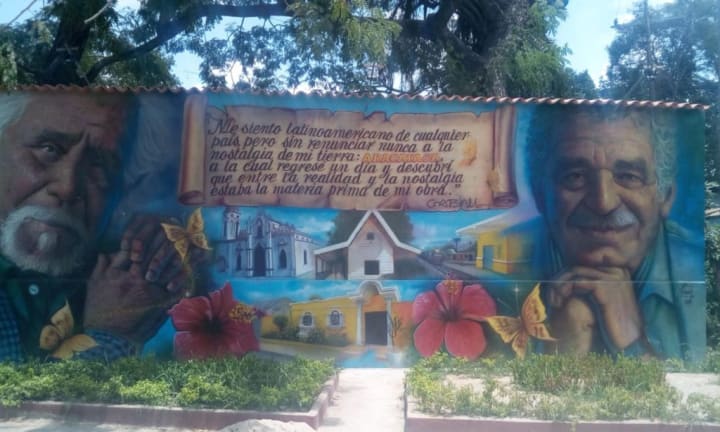Whispers of Wonder and Wisdom
Gabriel Garcia Marquez and His Enchanting Epics

In the captivating cavalcade of Colombian culture and its monumental figures, one name sparkles like a jewel — Gabriel García Márquez. A guiding star in the literary galaxy, García Márquez etched an indelible mark in the grand narrative of literature with his spellbinding tales, mesmerizing audiences far and wide.
Born beneath the golden sun on March 6, 1927, in the quaint coastal town of Aracataca, Colombia, García Márquez was nurtured amidst an aura of vibrant folklore and riveting tales. This spirited region later blossomed into the imagined land of Macondo, the mythical cradle of his masterwork, “One Hundred Years of Solitude.”

His literary voyage began with the crafting of exceptional pieces such as “La hojarasca” (1955) and “La mala hora” (1962). García Márquez began to weave threads of magical realism into his narratives, marrying the ordinary with the extraordinary. His bewitching words spun a vivid tapestry of Colombian society, entwining each thread to form an intricate picture.
His seminal creation, “One Hundred Years of Solitude,” emerged in 1967, launching García Márquez onto the global literary stage. A sprawling epic blurring the boundaries between reality and fantasy, the novel seduced audiences across the globe, cementing García Márquez’s status as a literary colossus.
Before his ascension as a novelist, García Márquez polished his craft as a journalist. This career path sharpened his observational acumen and furnished him with an intimate understanding of Latin America’s socio-political mosaic. His worldly encounters as a journalist unearthed hidden narratives, sprinkling reality with dashes of enchantment.

The crossroads of journalism and literature gave birth to García Márquez’s signature approach — “journalistic magic realism.” His unique methodology injected everyday happenings and personas with a sprinkling of fantasy, blurring the lines between the real and the imagined. His narratives became reflective pools, revealing the nuances of Latin American society and encouraging readers to question and discover their own realities.
The journey to sculpt “One Hundred Years of Solitude” was a challenging voyage that propelled García Márquez to the pinnacle of his creative prowess. His painstaking attention to detail and steadfast commitment to his art transformed a solitary labor into a multi-generational tale that encapsulates the essence of Latin America.
In 1982, the global community celebrated García Márquez’s remarkable contributions to literature with the award of the Nobel Prize in Literature. His Nobel lecture, “The Solitude of Latin America,” echoed profoundly in the hearts of audiences worldwide. Through his eloquent speech, García Márquez illuminated the unique hurdles and hopes of the Latin American continent while lauding its cultural vibrancy.
The Nobel Prize not only honored García Márquez’s talents but also amplified the voices of countless Latin American writers, acknowledging their distinct perspectives in the global literary conversation. García Márquez’s tales continue to charm, drawing readers into worlds where magic intertwines with reality, rendering the vibrant panorama of Latin American life.

The enduring imprint of Gabriel García Márquez on literature and beyond stands as a testament to his narrative wizardry. Through his stirring tales, he continues to beckon readers into wondrous realms where reality pirouettes gracefully with magic, reinforcing his legacy as a shining lighthouse in the literary expanse. His life’s work stands as a radiant exemplar of the transformative potential of literature and the everlasting magic of storytelling.






Comments
There are no comments for this story
Be the first to respond and start the conversation.